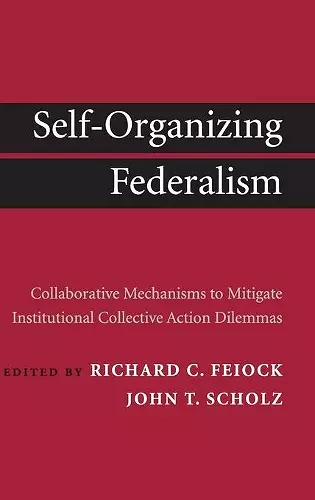Self-Organizing Federalism
Collaborative Mechanisms to Mitigate Institutional Collective Action Dilemmas
Richard C Feiock editor John T Scholz editor
Format:Hardback
Publisher:Cambridge University Press
Published:26th Oct '09
Currently unavailable, and unfortunately no date known when it will be back

This book investigates self-organizing institutions that resolve institutional collective action dilemmas in federalism, urban governance, and regional management of natural resources.
This book focuses on institutional collective action (ICA) dilemmas and the institutions developed by affected governments and interests to mitigate them. Feiock and Scholz apply the ICA framework to explore the critical role of these self-organizing institutions in the context of federalism, urban governance, and regional management.This book investigates the self-organizing responses of governments and interests to the institutional collective action (ICA) dilemmas of particular concern to students of federalism, urban governance, and regional management of natural resources. ICA dilemmas arise in fragmented systems whenever decisions by one independent formal authority do not consider costs or benefits imposed on others. The ICA framework analyzes networks, joint projects, partnerships, and other mechanisms developed by affected parties to mitigate ICA decision externalities. These mechanisms play a widespread role in federalist systems by reshaping incentives to encourage coordination/cooperation. The empirical studies of urban service delivery and regional integration of regional resource management address three questions: How does a given mechanism mitigate costs of uncoordinated decisions? What incentives do potential members have to create the mechanism? How do incentives induced by the mitigating mechanism affect its sustainability in a changing environment and its adaptability to other ICA dilemmas?
'Feiock and Scholz are on their way to doing for intergovernmental relations what Elinor Ostrom has done for common pool resource management: helping us understand how externalities can be overcome through bottom-up, local solutions. These remedies often surpass centrally provided solutions because they are designed to fit local needs, traditions, and capacities. The contributed chapters fill out the theory well and offer excellent examples of the variety of homegrown solutions. Those who set policy as well as those who study it will find much of interest in this unique volume.' Jenna Bednar, University of Michigan
'Today's policy problems cannot be solved by analysts recommending one solution for all problems based on narrow disciplinary viewpoints. Most policy problems are multi-level where solutions that work at one level, or for one problem, do not work at other levels or for other problems. This book analyzes multiple solutions without getting lost in chaos. An essential read!' Elinor Ostrom, Indiana University
'How can we encourage collaborative action in formally decentralized governance settings? Which of many possible institutional arrangements among local governments and agencies offers the best match for a particular policy challenge? How can we make sense of the myriad collaborative possibilities - networks, contracts, partnerships, and the like? Self-Organizing Federalism makes a significant contribution by offering needed and welcome answers.' Laurence J. O'Toole, Jr, University of Georgia
'The authors have produced an intelligent, accessible, and academic agenda-setting volume worthy of wide readership.' Mark Rhinard, Public Administration
ISBN: 9780521764933
Dimensions: 240mm x 162mm x 29mm
Weight: 658g
368 pages